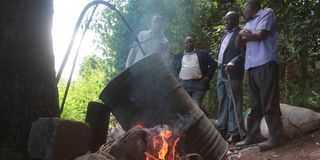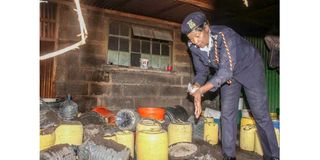Premium
How unlicensed bars fuel alcoholism in central Kenya

Alcohol and drug use presents a danger to public health and quality of life, affecting socioeconomic development.
What you need to know:
- In Nyandarua County, where the number of bars has more than doubled, with only a fraction of them being licensed.
- Unlicensed traders are now obtaining court orders to operate.
The recent tragedy in Kirinyaga County where over 15 people lost their lives after consuming poisonous illicit alcohol has shone the spotlight on the alarming proliferation of unregulated bars and alcohol outlets in various counties in Mount Kenya and the Rift Valley.
The victims consumed the deadly liquour at an unlicensed establishment called California Bar in Kangai village.
Investigations by Nation.Africa has revealed that some counties in the two regions are grappling with thousands of unregulated alcohol outlets, even outnumbering churches, schools and hotels in some towns.
The worst-affected counties include Narok, Nyandarua, Nakuru, Kiambu, Kirinyaga, Laikipia, and Tharaka Nithi.
Surprisingly, many of these bars and alcohol outlets operate without the necessary licenses, making it challenging for authorities to regulate the products they sell.

The bar in Kangai village, Kirinyaga County, that was set ablaze following the death of several people who consumed an illicit brew.
The problem is particularly pronounced in Nyandarua County, where the number of bars has more than doubled, with only a fraction of them being licensed.
Efforts to reduce the number of bars have been hampered by unlicensed traders obtaining court orders to operate.
Where bars outnumber schools and churches, combined
At the advent of devolution, the number of bars in Nyandarua county was about 200.
When the county's second governor Francis Kimemia took over from his predecessor Daniel Waithaka, the county had 1,200 licensed bars.
Today, the number has more than doubled with authorities admitting that drinking joints are now more than schools and churches combined.
The true picture of the huge number of bars in Nyandarua , majority of them being unlicensed, is clearly illustrated when one visits the Mairo-Inya trading centre, where the number of bars outnumbers butcheries and ordinary shops by far.

Police and administrators at an illicit brewery.
Mairo-Inya a small trading centre in Ndaragwa constituency located along the Nyahururu - Nyeri highway, ‘boasts’ of about 56 outlets.
A spot check by Nation.Africa at Wanjohi ward, Kipipiri constituency, reveals that there are 21 primary schools and eight churches against more than 100 bars and alcohol outlets in the ward.
Local religious leaders lament that area residents appreciate alcohol more than education and spirituality.
Blame game
How the number of bars increased from 1,200 to about 2,600 has become a blame game between the county government and other local leaders.
In Nyandarua, there are 2,600 existing bars and alcohol-selling outlets spread across the county, with only about 600 being licensed to operate, according to data from the County Liquor Control Board.
"Only about 623 traders out of the 2,600 outlets applied and are allowed to trade after vetting by the Nyandarua County Alcoholic Drinks Control Committee recently. But some moved to court and obtained court orders that they use to run their outlets," revealed a senior County government official.

Police in Murang'a South check illicit brews confiscated in Maica Ma Thi village in a past crackdown.
Law versus alcohol
However, Members of the county assembly have enacted the new Nyandarua County Alcoholic Drinks Act, 2023, which aims to end the uptake of illicit liquor in the county.
The new law stipulates that every sub-county will have an Alcoholic Drinks Regulation Committee, which will vet applications for liquor sellers, subsequently filing a quarterly report to the County Alcoholic Drinks Regulation and Management Committee.
The law also bars anyone from producing, manufacturing and selling alcohol in the county without a valid licence, contrary to which offenders could be fined Sh30,000 or jailed for a term not exceeding four months.
Supermarkets, chain retailers and restaurants are also barred from selling alcohol.
Licenses will not be granted to retail outlets commonly referred to as wines and spirits.
According to the Nyandarua Interfaith Council chairman Bishop Josam Kariuki, there is need to crack the whip on unscrupulous traders, who have over the years opened unlicensed alcoholic joints, mostly selling drinks that do not meet the standards of the Kenya Bureau of Standards.
“Unless we come together and formulate stringent measures to address the problem, a whole community would be on the verge of extinction.
"The availability of alcoholic drinks has led to increased family breakups, deaths and crimes associated with alcoholism,” said Bishop Kariuki.
Nyandarua leaders say alcoholism is worrying in the region, with a high number of youth indulging in drug and substance abuse.
“I will not relent in fighting against alcohol, drugs, and substance abuse within Nyandarua County and I am deploying all laws and policies that address the menace.
"It is no longer tenable to address the liquor licensing as merely a social and revenue issue, but one that’s now touching on the very survival of our youth and potential of our county to develop and sustain a functional population,” said Governor Moses Kiarie Badilisha.
Strain in Nakuru
In Nakuru County, a survey by the Bar Owners Association revealed that over 700 bars are operating without licenses.
The proliferation of such establishments, especially in areas like Kanu Street in Nakuru City, underscores the challenges of regulating the alcohol trade.
So far 2,900 liquor premises are approved with the remaining 700 requiring to be reviewed.
Kanu Street, a red light street in Nakuru City alone boasts of more than 200 drinking joints.

Sub-county police commander Elena Wairimu Kabukuru destroys illicit brew in Nakuru East on May 24, 2019. Maendeleo ya Wanawake has initiated a campaign to rehabilitate addicts.
The Director for Alcohol and Drinks Control, Mr Xavier Lugaga says the county is working closely with the national government to reduce the menace of alcoholism, the sale of illicit brew and drug abuse.
"We are very keen to ensure only licenced outlets operate across Nakuru County. We are conducting an audit to also ensure no bars operate near schools and residential areas," stated Mr Lugaga.
In 2021, 16 people died in the Bahati and Njoro sub-Counties of Nakuru, after consuming poisonous illicit liquor.
On August 8, 2021, a group of Hodi Hodi residents, in Bahati, Nakuru County, consumed illicit brew and ten, among them a pregnant woman, died.
Five of the people died within 24 hours and five others days later while receiving treatment in different hospitals in Nakuru.
They allegedly consumed ‘poisonous’ illicit brew at a drinking joint in the JC area of Kabatini, Bahati sub-County.
Barely three months later, on December 6, 2021, six other people died in the Jawatho area, in Njoro, Nakuru County, after consuming liquor suspected to have been poisonous.
Laikipia tightens war on brew
In Laikipia County, Governor Joshua Irungu says he plans to reduce bar outlets in the region by half to enhance the war on illicit brews and second-generation alcoholic drinks.
According to Governor Irungu, there were over 3,000 new liquor licence applicants, last year, but the county administration intends to reduce operating outlets to less than 1,500.
"My administration is committed to proactively deal with drugs, substance abuse and alcoholism, which is dispiriting the young generation," stated Governor Irungu.
In Murang’a County, Governor Irungu Kang'ata announced a reduction of the drinking joints from 2,971 to about 1,032.

Murang'a Governor Irungu Kang'ata. He has vowed to cut the number of bars in the county by half.
Governor Muthomi Njuki of Tharaka Nithi has introduced strict license application procedures under the Tharaka Nithi County Alcoholic Drinks Control Act 2021. The regulations aim to control the number of bars in towns and markets and limit the ratio of bars to other consumable goods shops.
In the whole county, only four towns, Kathwana, Chuka, Marimanti and Chogoria are allowed to have a night club in line with the Tharaka Nithi County Alcoholic Drinks Control Act 2021.
County governments are now implementing measures to address the issue, with a focus on licensing, regulation, and enforcement.





